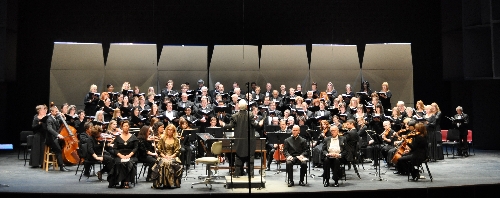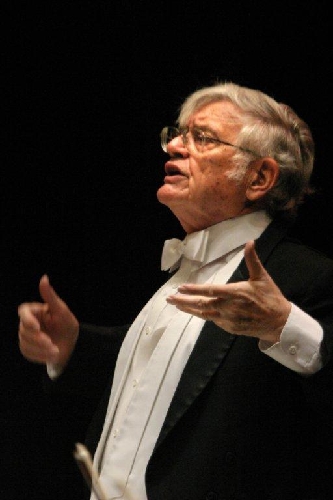Southern Nevada Musical Arts Society brings guest soloists for Mendelssohn’s ‘St. Paul’ at UNLV


Reining in his emotions to belt out a performance?
Easier said than sung.
"It says, ‘Let the spirit of God dwell in you.’ … I need a timeout here, I’m sorry, I get emotional," says bass-baritone singer Neil Wilson, the phone line from Medford, Ore., going silent for several seconds as the 82-year-old composes himself, his voice eventually returning but slightly cracking.
"It’s also the way that (composer Felix) Mendelssohn writes a musical line that is just so beautiful that I’m moved by the beauty of it. It takes me back to my childhood. I was always touched by the stories in the Bible as a kid in East Texas and Oklahoma. To set it to music made it all the more meaningful."
Pledging to battle back tears onstage, Wilson will sing the title role of "St. Paul" in Mendelssohn’s oratorio Sunday afternoon, performed by the 40-piece orchestra and 80-voice choir of the Southern Nevada Musical Arts Society at the University of Nevada, Las Vegas.
"These great sacred masterworks, the composers put their best music into them, their best skills," music director Doug Peterson says. "The singers fall in love with it; it’s kind of gorgeous. It’s very romantic, and the harmonies are not dissonant."
Composed in 1834 and the first of Mendelssohn’s oratorios — he wrote it at age 25 — "St. Paul" links passages from the New Testament (largely the Acts of the Apostles) to the Old Testament. "It’s the story of Saul, who became Paul once he was struck by the light," says Wilson, who will be joined by fellow soloists Scott Williamson (tenor), his wife, Amy Cofield Williamson (soprano), and Valeria Ore (mezzo-soprano) in other roles.
"As Jesus revealed himself to (Paul), he would convert him from an unbeliever to one of the most (ardent) believers and prophets for the Christian faith in his time."
Ironically, its composer was not of the faith. "It’s interesting that Mendelssohn took this on being Jewish," Wilson says, "but his family had become Protestant, which in Northern Germany meant Lutheran."
Said to be highly influenced by the compositions of Bach, Beethoven and Mozart, Mendelssohn inserted choral passages reminiscent of them, particularly Bach, which was not universally applauded. "The story is that one of his collaborators protested the use of these chorals because he felt they interfered with the ongoing story of St. Paul," Wilson says. "When I was directing a church choir in Albuquerque, it left an interesting impression on me."
Though the first half of the work is chockablock with narrative fireworks — Paul protests against the faithful, and the chorus vigorously responds — Peterson acknowledges a ramping down, both musically and storywise, in the concluding act.
"Dramatically, the second part is probably not as interesting for some folks as ‘Elijah,’ " says Peterson, referring to Mendelssohn’s more well-known work chronicling events in the life of the biblical prophet. "That maintains its dramatic sense all the way, and ‘St. Paul’ doesn’t have as much action. But it’s so rewarding to our audience and our singers."
Analyzing the story, Wilson attributes the calmer second half to Paul’s conversion. "After he is converted, you sense there is more peacefulness in his life," Wilson says. "I suppose an audience might expect more of what they heard in the first half, but I find the music particularly peaceful and inspiring."
Not to mention highly emotional.
"I have to be careful not to let the sentimentality of some of what I’m singing overwhelm me because I’m a patsy for that," Wilson says, as he puts down the phone to scan the score, returning to recite: " ‘I praise thee oh Lord with all my heart forever more.’ You add the horns and the clarinets and the strings … I could weep."
Audible sniffling over the phone suggests he’s about to do just that.
Contact reporter Steve Bornfeld at sbornfeld@ reviewjournal.com or 702-383-0256.
PreviewMendelssohn’s “St. Paul” performed by the Southern Nevada Musical Arts Society
3 p.m. Sunday
Artemus W. Ham Concert Hall at the University of Nevada, Las Vegas, 4505 S. Maryland Parkway
$8 for students with ID, $12 for seniors, military and the disabled, $18 general admission (895-2787)












